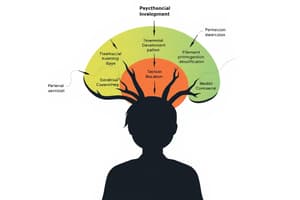Podcast
Questions and Answers
What was Erik Erikson's original surname before he changed it?
What was Erik Erikson's original surname before he changed it?
- Homburger (correct)
- Erikson
- Freud
- Vienna
Where was Erik Erikson born?
Where was Erik Erikson born?
- Copenhagen, Denmark
- Vienna, Austria
- Frankfurt, Germany (correct)
- Berlin, Germany
How did Erik Erikson use arts to establish his identity?
How did Erik Erikson use arts to establish his identity?
- By earning mediocre grades
- By traveling extensively
- By showing talent in arts (correct)
- By excelling academically
What was the profession of Dr. Theodore Homburger in relation to Erik Erikson?
What was the profession of Dr. Theodore Homburger in relation to Erik Erikson?
At what age did Erik Erikson receive an offer to teach at a school in Vienna?
At what age did Erik Erikson receive an offer to teach at a school in Vienna?
What drew Erik Erikson to Sigmund Freud?
What drew Erik Erikson to Sigmund Freud?
What did Erikson believe about the ego in terms of coping mechanisms?
What did Erikson believe about the ego in terms of coping mechanisms?
During which developmental stage does the crisis 'Trust versus Mistrust' occur?
During which developmental stage does the crisis 'Trust versus Mistrust' occur?
What is the term used for the self-image formed during adolescence?
What is the term used for the self-image formed during adolescence?
Which psychosocial stage involves developing new skills and a sense of competence?
Which psychosocial stage involves developing new skills and a sense of competence?
What does the term 'Fidelity' encompass in Erikson's theory?
What does the term 'Fidelity' encompass in Erikson's theory?
When does the crisis of 'Identity Cohesion versus Role Confusion' typically occur?
When does the crisis of 'Identity Cohesion versus Role Confusion' typically occur?
According to Erikson, what affects the formation of ego identity?
According to Erikson, what affects the formation of ego identity?
What did Erikson define as identity consolidation?
What did Erikson define as identity consolidation?
What is Negative emotionality (NEM) characterized by?
What is Negative emotionality (NEM) characterized by?
Which factor did Erikson consider as part of ego identity?
Which factor did Erikson consider as part of ego identity?
What does Positive emotionality (PEM) involve?
What does Positive emotionality (PEM) involve?
Why was Erikson drawn to Freud?
Why was Erikson drawn to Freud?
Which event marked the beginning of Erikson's professional career?
Which event marked the beginning of Erikson's professional career?
In which country did the Eriksons settle before coming to the United States?
In which country did the Eriksons settle before coming to the United States?
What did Joan do to support Erik and their family?
What did Joan do to support Erik and their family?
Which institute did Erikson join where he taught and continued his psychoanalytic work with children?
Which institute did Erikson join where he taught and continued his psychoanalytic work with children?
What principle governs human development according to Erikson?
What principle governs human development according to Erikson?
What is generativity in middle age positively correlated with?
What is generativity in middle age positively correlated with?
How do people high in generativity differ from those low in generativity?
How do people high in generativity differ from those low in generativity?
What may large-scale technological changes negatively impact related to generativity?
What may large-scale technological changes negatively impact related to generativity?
Which stage of psychosocial development involves recalling and examining past choices?
Which stage of psychosocial development involves recalling and examining past choices?
What is linked to the achievement of ego integrity?
What is linked to the achievement of ego integrity?
According to Erikson, which gender may find it more difficult to engage in a dispassionate reflection on life?
According to Erikson, which gender may find it more difficult to engage in a dispassionate reflection on life?
Flashcards are hidden until you start studying
Study Notes
- Erik Erikson experienced unresolved personal identity crises throughout his life, starting with keeping his original surname, Homburger, until age 37 and then changing it to Erik Homburger Erikson upon becoming a US citizen.
- Erikson's mother was Danish from a wealthy Jewish family, and his biological father's identity was never revealed to him. He was raised by his stepfather, Dr. Theodore Homburger, who he did not know was not his biological father.
- Erikson struggled in school with mediocre grades but showed talent in the arts, using this talent to establish his identity.
- Erikson dropped out of conventional society, describing himself as morbidly sensitive and neurotic, and traveled extensively in Europe, observing life and recording his thoughts.
- At the age of 25, Erikson began teaching in a school in Vienna for Sigmund Freud's patients' children, which marked the beginning of his professional career and helped him find an identity.
- Erikson had three marriages with Joan Serson, with the most memorable being a Jewish ceremony filled with errors and a mockery of Jewish customs. Joan supported him emotionally and physically, becoming the foundation of their family.
- In 1933, Erikson and his family immigrated to the US from Europe to escape the growing Nazi threat, settling in Boston where he established a psychoanalytic practice specializing in treating children.
- Erikson developed the psychosocial stages of personality development, based on the epigenetic principle of maturation, with each stage involving a crisis, adaptive coping, and the development of basic strengths such as trust, autonomy, initiative, and identity.
- Erikson's theory covers stages like trust versus mistrust in infancy, autonomy versus doubt and shame in early childhood, industry versus inferiority in middle childhood, and identity cohesion versus role confusion in adolescence.
- Generativity in middle age is a key concept in Erikson's theory, related to warm parenting in childhood, positively correlated with power and intimacy motivation, and associated with various positive traits like extraversion, self-esteem, and altruism.
- Erikson believed that people in maturity and old age reflect on their lives, aiming to achieve ego integrity linked to well-being, positive health, and lower fear of death. He noted potential gender differences in aging and the impact of technology on generativity.
Studying That Suits You
Use AI to generate personalized quizzes and flashcards to suit your learning preferences.




